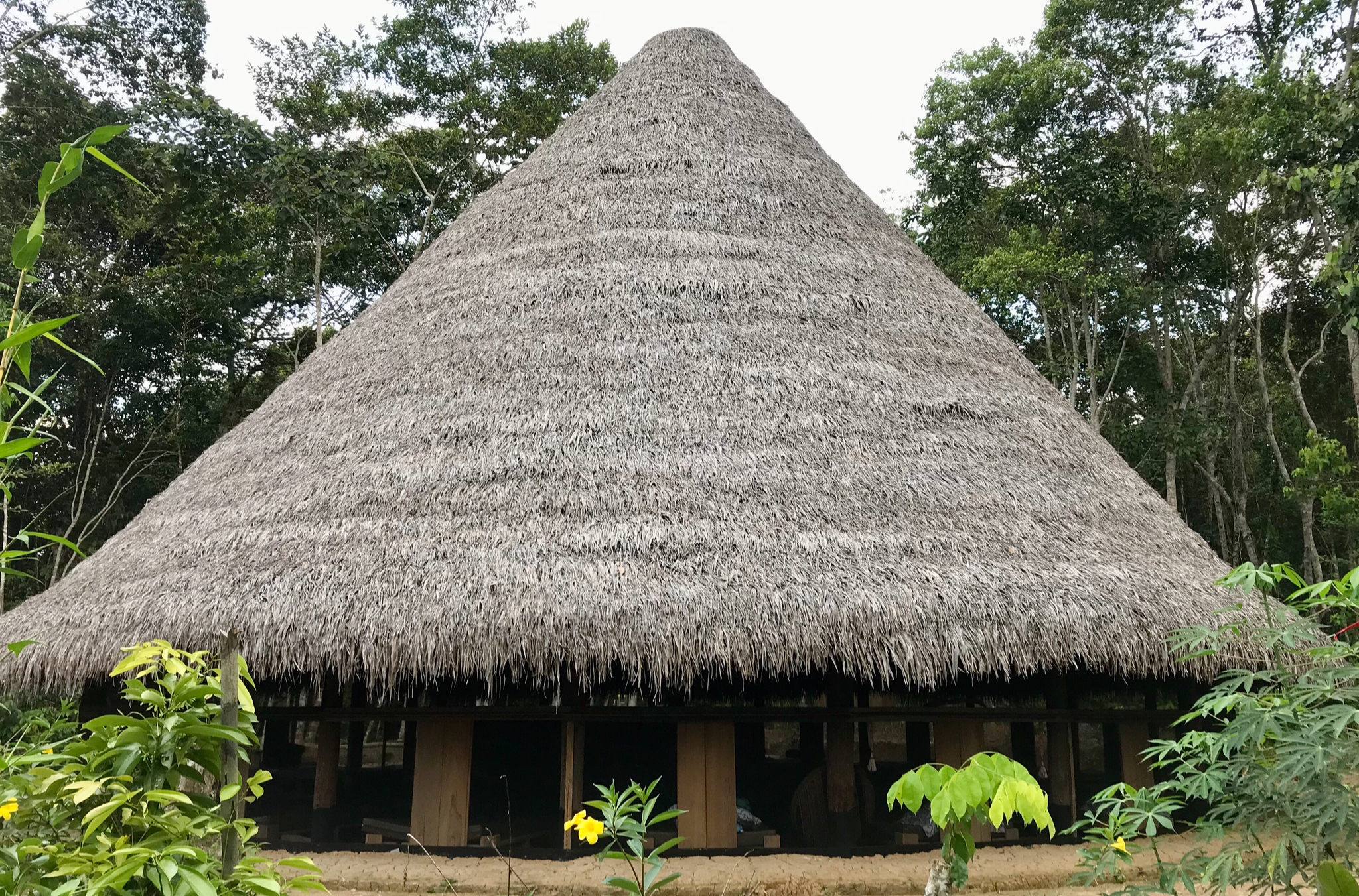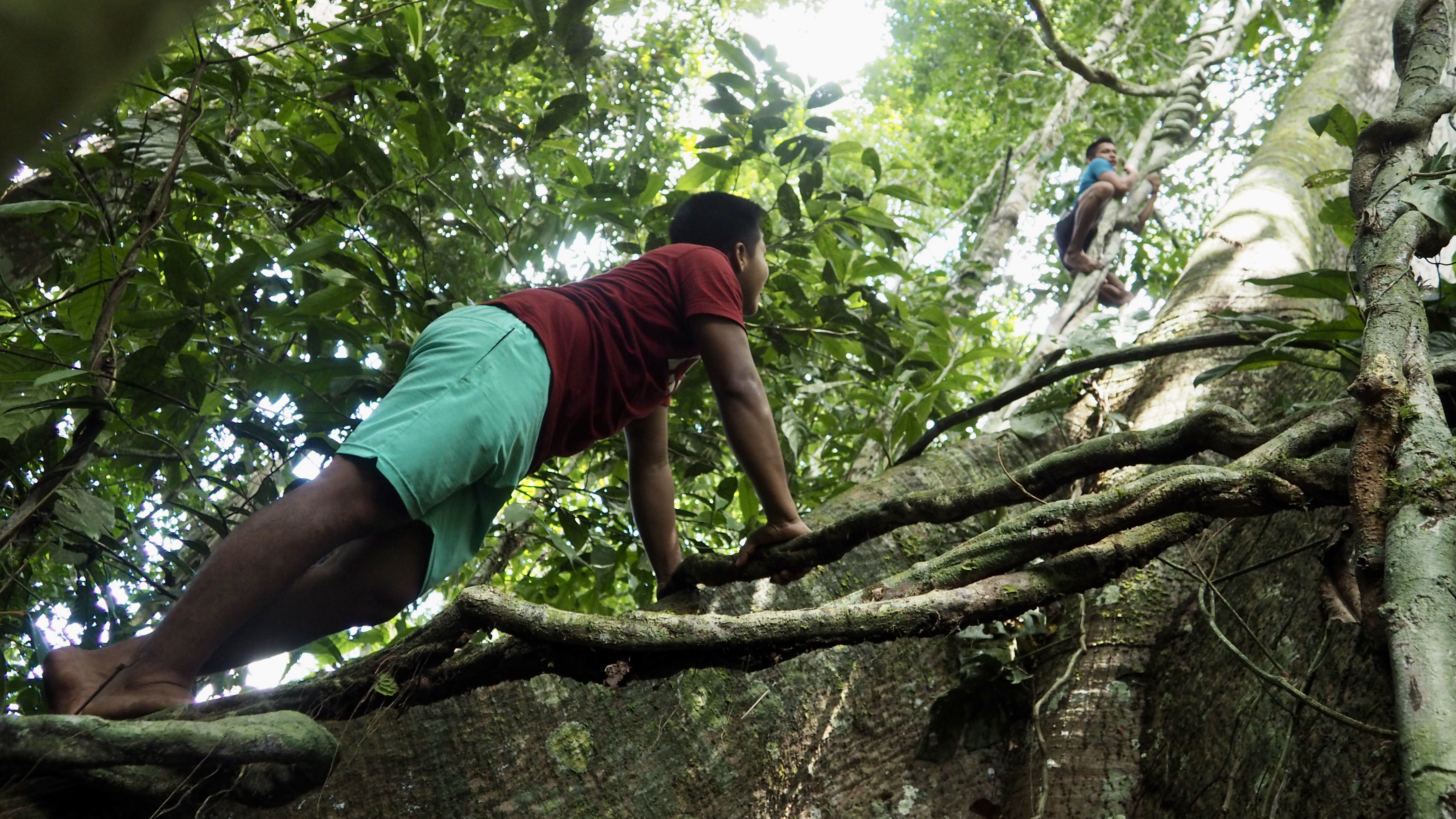Friends love to make fun of my crazy adventures and sudden life shits. The above question came as a joke but got me thinking about it more seriously…did Ayahuasca have anything to do with it?
To be very honest with you, Ayahuasca scared the shit out of me! Not literally, though. No, I did not poop in my pants during the ceremony! If you are not very familiar with Ayahuasca, this is a powerful traditional Amazonian plant medicine taken in the setting of a ceremony that includes darkness and chant. When the medicine starts to work, yawning, vomiting, and sometimes unexpected pooping and peeing can happen. These are some of the ways we can get rid of unhealthy things inside of us.
Especially the 2nd and 3rd times that I took this medicine, they were such intense experiences for me that they did fuel my desire to learn about more gentle approaches to healing. So yes, in a way, Ayahuasca helped me get on this path.

Here those crazy ceremonies of mine took place. They call this type of building a Maloka. You find it in many retreat centers. Traditionally similar building were also used by families to live in.
Working in the Amazon rainforest
The Peruvian NGO that I work for is brought to life by an Ayahuasca retreat center: the Temple of the Way of Light. It was founded out of deep gratitude for all the healing that had happened by working with the plant medicine and the indigenous Shipibo tradition. Our NGO’s mission is to give back to the forest, to protect it, and to protect local and indigenous wisdom.
The retreat centre and our Chaikuni Institute work closely together, and we are able to observe and also experience firsthand the deep healing that Ayahuasca can provide, physically, emotionally, and mentally. The dedication of the traditional healers is awe-inspiring. The transformation from how people come in to how they are when they go out is mesmerizing. If you want to and have the opportunity to work with Ayahuasca, go for it!
But I want you to know a few things first…
Although I have also taken part in a ceremony in which a quarter of the participating group was overcome with waves of laughter for about an hour, Ayahuasca can be very tough. It is not like an aspirin that suppresses your headache until the pill’s effects wear off, and then you take another one to suppress your pain some more. Oh no!
Some time after my difficult ceremonies, I started to work with a specialist who helps people integrate their spychedelic experience: Publio. And Publio explained that plant medicine works like this: It can take you to your most uncomfortable feelings, those that you normally avoid and suppress, and it says, “Now you are going to sit with this until it becomes manageable for you.”
And that can be really hard, and you might need support after the retreat on the road to healing. It’s not an easy journey for everyone, but you’ll learn beautiful things, and eventually, you will heal (if you do the work).
If you are ready for Ayahuasca, then hold just another moment!
Don’t book your flight just yet. And especially, don’t book your retreat just yet. This needs some caution. Experts in the field of psychedelic healing like Dr. Gabor Mate and indigenous leaders like Isku Kua warn against tricksters and charlatans, or just people with the best intentions who do not know what they are doing.
Ayahuasca can overwhelm you with love, making you an easy target to take (financial or other) advantage of. It can bring up deep trauma, and this needs to be dealt with in a professional way. If the people facilitating your retreat cannot handle your emotions or aren’t even able to properly listen to you when you need to talk, then the retreat might not become the beneficial experience it could have been.
Please do your research and trust your gut! At the end of this article I provided some links to centres that we hear good things about. And yes, getting yourself into trustworthy hands isn’t always cheap.
Here my aha moment happened
This is what really fueled my desire to learn about the ways in which I can support my own healing and how I can empower others to do the same. These Ayahuasca trips are unaffordable for a huge part of the world’s population. Many people struggle to even pay for basic medical support! So how do we depend less on others and take more control of our own health? That question eventually led me to study nutrition. And in the upcoming posts, you can start to understand why our diet is crucial to taking proper care of ourselves.
Food as medicine
Eating to heal and maintain health is easy but also a complex matter. First of all, we have gotten so used to eating unhealthy stuff. Next to that, we have become very alienated from our food. We no longer know where or how it grows or what benefits and disadvantages specific foods can have. Many foods we only know in their processed forms, and in this form, some, up to many of their benefits have been stripped away.
And, as I discovered at the beginning of my naturopathic nutrition studies, many of us know so little about how our bodies actually work! This also means that often we do not fully understand why a specialist, like a nutritionist, asks us to make certain changes in our diet or lifestyle, which then makes it more difficult for us to remain committed to the health goals we set for ourselves, physically and psychologically.
Therefore, this will be the first tree that we must climb: getting to know more about our bodies and how they make use of our food. We’re going to look at:
- How our body turns food into energy
- What our body needs from us to do that job properly
- The wonders of the digestive system
- The immense importance of gut health
And yes, we’re going to have to talk about poop! Stay tuned!

Ayahuasca centres
My neighbours: https://templeofthewayoflight.org
Advised by Gabor Maté: https://soltara.co
Indigenous communities that have worked with Ayahuasca for centuries:
Yawanawa / Huni Kuin: https://uniretreats.org
Shipibo MasterPlant Diet Centre: https://shipiborao.com/
Psychedelic integration
Publio: https://www.publiovalle.com/
Juliana: https://www.julianabizare.com/